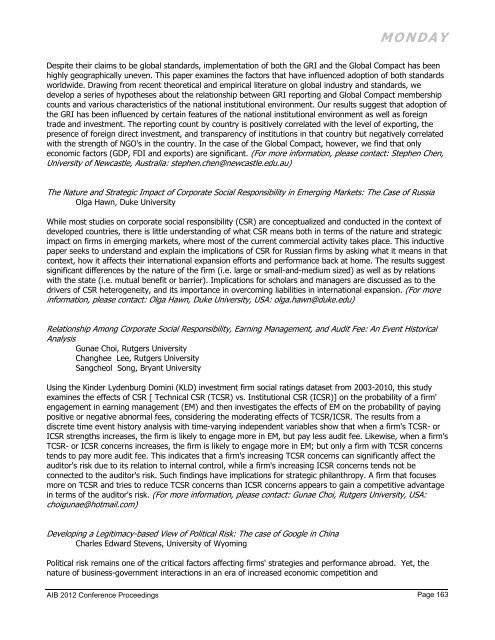AIB 2012 Conference Proceedings - Academy of International ...
AIB 2012 Conference Proceedings - Academy of International ...
AIB 2012 Conference Proceedings - Academy of International ...
You also want an ePaper? Increase the reach of your titles
YUMPU automatically turns print PDFs into web optimized ePapers that Google loves.
MONDAY<br />
Despite their claims to be global standards, implementation <strong>of</strong> both the GRI and the Global Compact has been<br />
highly geographically uneven. This paper examines the factors that have influenced adoption <strong>of</strong> both standards<br />
worldwide. Drawing from recent theoretical and empirical literature on global industry and standards, we<br />
develop a series <strong>of</strong> hypotheses about the relationship between GRI reporting and Global Compact membership<br />
counts and various characteristics <strong>of</strong> the national institutional environment. Our results suggest that adoption <strong>of</strong><br />
the GRI has been influenced by certain features <strong>of</strong> the national institutional environment as well as foreign<br />
trade and investment. The reporting count by country is positively correlated with the level <strong>of</strong> exporting, the<br />
presence <strong>of</strong> foreign direct investment, and transparency <strong>of</strong> institutions in that country but negatively correlated<br />
with the strength <strong>of</strong> NGO's in the country. In the case <strong>of</strong> the Global Compact, however, we find that only<br />
economic factors (GDP, FDI and exports) are significant. (For more information, please contact: Stephen Chen,<br />
University <strong>of</strong> Newcastle, Australia: stephen.chen@newcastle.edu.au)<br />
The Nature and Strategic Impact <strong>of</strong> Corporate Social Responsibility in Emerging Markets: The Case <strong>of</strong> Russia<br />
Olga Hawn, Duke University<br />
While most studies on corporate social responsibility (CSR) are conceptualized and conducted in the context <strong>of</strong><br />
developed countries, there is little understanding <strong>of</strong> what CSR means both in terms <strong>of</strong> the nature and strategic<br />
impact on firms in emerging markets, where most <strong>of</strong> the current commercial activity takes place. This inductive<br />
paper seeks to understand and explain the implications <strong>of</strong> CSR for Russian firms by asking what it means in that<br />
context, how it affects their international expansion efforts and performance back at home. The results suggest<br />
significant differences by the nature <strong>of</strong> the firm (i.e. large or small-and-medium sized) as well as by relations<br />
with the state (i.e. mutual benefit or barrier). Implications for scholars and managers are discussed as to the<br />
drivers <strong>of</strong> CSR heterogeneity, and its importance in overcoming liabilities in international expansion. (For more<br />
information, please contact: Olga Hawn, Duke University, USA: olga.hawn@duke.edu)<br />
Relationship Among Corporate Social Responsibility, Earning Management, and Audit Fee: An Event Historical<br />
Analysis<br />
Gunae Choi, Rutgers University<br />
Changhee Lee, Rutgers University<br />
Sangcheol Song, Bryant University<br />
Using the Kinder Lydenburg Domini (KLD) investment firm social ratings dataset from 2003-2010, this study<br />
examines the effects <strong>of</strong> CSR [ Technical CSR (TCSR) vs. Institutional CSR (ICSR)] on the probability <strong>of</strong> a firm'<br />
engagement in earning management (EM) and then investigates the effects <strong>of</strong> EM on the probability <strong>of</strong> paying<br />
positive or negative abnormal fees, considering the moderating effects <strong>of</strong> TCSR/ICSR. The results from a<br />
discrete time event history analysis with time-varying independent variables show that when a firm's TCSR- or<br />
ICSR strengths increases, the firm is likely to engage more in EM, but pay less audit fee. Likewise, when a firm's<br />
TCSR- or ICSR concerns increases, the firm is likely to engage more in EM; but only a firm with TCSR concerns<br />
tends to pay more audit fee. This indicates that a firm's increasing TCSR concerns can significantly affect the<br />
auditor's risk due to its relation to internal control, while a firm's increasing ICSR concerns tends not be<br />
connected to the auditor's risk. Such findings have implications for strategic philanthropy. A firm that focuses<br />
more on TCSR and tries to reduce TCSR concerns than ICSR concerns appears to gain a competitive advantage<br />
in terms <strong>of</strong> the auditor's risk. (For more information, please contact: Gunae Choi, Rutgers University, USA:<br />
choigunae@hotmail.com)<br />
Developing a Legitimacy-based View <strong>of</strong> Political Risk: The case <strong>of</strong> Google in China<br />
Charles Edward Stevens, University <strong>of</strong> Wyoming<br />
Political risk remains one <strong>of</strong> the critical factors affecting firms' strategies and performance abroad. Yet, the<br />
nature <strong>of</strong> business-government interactions in an era <strong>of</strong> increased economic competition and<br />
<strong>AIB</strong> <strong>2012</strong> <strong>Conference</strong> <strong>Proceedings</strong><br />
Page 163

















